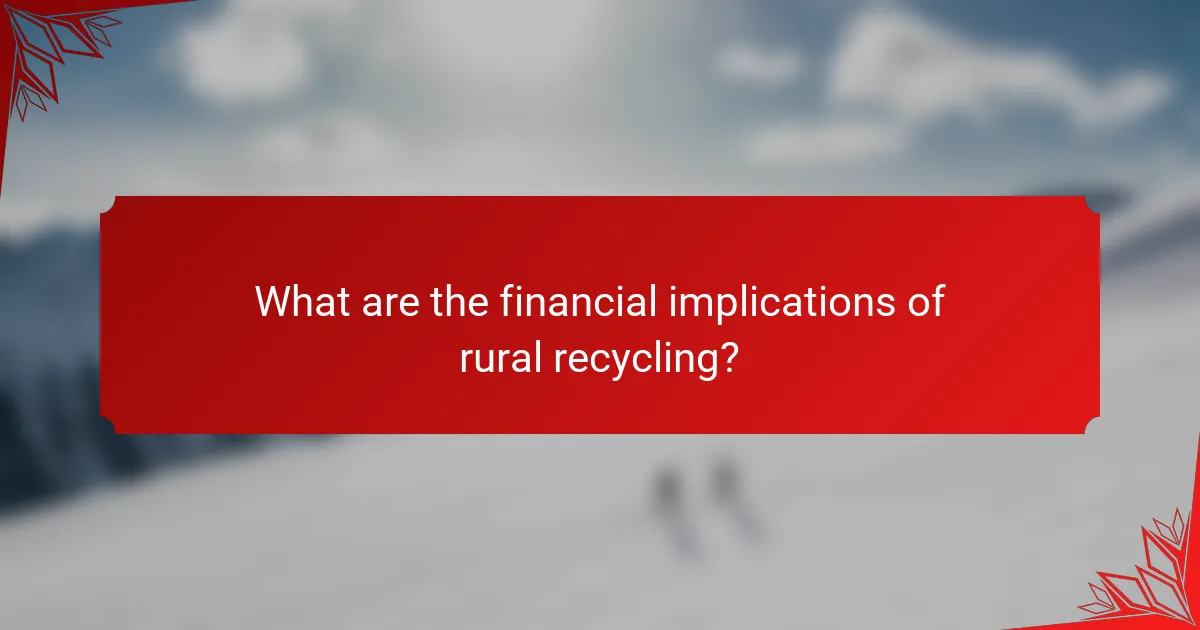Rural recycling programs encounter significant challenges, such as limited access to facilities and low participation rates, which impede their overall effectiveness. To overcome these obstacles, it is essential to implement targeted strategies like community education, mobile recycling units, and partnerships with local businesses that can enhance engagement and streamline the recycling process.

What are the challenges of rural recycling programs?
Rural recycling programs face several key challenges that hinder their effectiveness, including limited access to recycling facilities, low participation rates, and insufficient funding and resources. Addressing these issues is crucial for improving recycling efforts in rural areas.
Limited access to recycling facilities
Many rural communities lack nearby recycling centers, making it difficult for residents to recycle their waste. The distance to these facilities can discourage individuals from participating in recycling programs, as transportation costs and time can be significant.
To mitigate this challenge, local governments can explore partnerships with private companies to establish mobile recycling units or drop-off locations. This approach can enhance accessibility and convenience for residents.
Low participation rates
Participation in recycling programs is often lower in rural areas compared to urban settings. Factors contributing to this include a lack of awareness about recycling benefits and insufficient education on how to recycle properly.
Community outreach initiatives, such as workshops and informational campaigns, can help increase awareness and encourage participation. Providing clear guidelines on accepted materials can also improve compliance and reduce contamination in recycling streams.
Insufficient funding and resources
Rural recycling programs frequently struggle with limited budgets, which can restrict their ability to implement effective initiatives. Funding shortages can lead to inadequate collection services and insufficient public education efforts.
To address funding challenges, rural communities can seek grants from state and federal programs dedicated to environmental sustainability. Collaborating with local businesses for sponsorships or donations can also provide additional resources for recycling initiatives.

What solutions exist for rural recycling programs?
Rural recycling programs can thrive through various solutions that enhance participation and efficiency. Key strategies include community education initiatives, mobile recycling units, and partnerships with local businesses, each addressing unique challenges faced in rural areas.
Community education initiatives
Community education initiatives are crucial for raising awareness about the importance of recycling in rural areas. These programs can include workshops, informational flyers, and social media campaigns that inform residents about what can be recycled and the environmental benefits of recycling.
Effective education often involves local leaders or volunteers who can share personal stories and experiences, making the message more relatable. For instance, organizing school programs can engage younger generations and encourage family participation in recycling efforts.
Mobile recycling units
Mobile recycling units provide a flexible solution for rural communities with limited access to recycling facilities. These units can travel to various locations on a scheduled basis, allowing residents to drop off recyclable materials conveniently.
Implementing a mobile unit requires careful planning, including route optimization and scheduling to maximize participation. Communities can consider partnerships with local governments or organizations to fund and operate these units, ensuring sustainability and regular service.
Partnerships with local businesses
Forming partnerships with local businesses can significantly enhance rural recycling programs. Businesses can serve as collection points for recyclable materials, making it easier for residents to participate without traveling long distances.
Additionally, local businesses may offer incentives, such as discounts or rewards, to customers who bring in recyclable items. This not only promotes recycling but also fosters community engagement and supports local economies.

How can rural areas improve recycling participation?
Rural areas can enhance recycling participation by implementing targeted strategies that engage residents and simplify the recycling process. Focusing on incentives and awareness can significantly boost community involvement and compliance.
Incentive programs for residents
Incentive programs can motivate residents to recycle more effectively by offering tangible rewards for participation. These may include discounts on utility bills, gift cards, or entry into local raffles for those who consistently recycle.
Communities can also consider providing free recycling bins or collection services to reduce barriers. For example, a program that offers a small monthly credit for households that meet recycling goals can encourage consistent participation.
Awareness campaigns
Awareness campaigns are essential for educating residents about the importance of recycling and how to do it correctly. These campaigns can utilize local media, social media platforms, and community events to spread information about recycling guidelines and benefits.
Effective campaigns often include visual aids, such as posters or flyers, that outline what materials are recyclable. Hosting workshops or informational sessions can also help clarify common misconceptions and encourage community dialogue about recycling practices.

What best practices can enhance rural recycling efforts?
Enhancing rural recycling efforts involves implementing effective strategies that address local needs and resources. Best practices include fostering collaboration with local governments and establishing convenient drop-off centers to improve accessibility and participation.
Collaboration with local governments
Collaboration with local governments is crucial for the success of rural recycling programs. Local authorities can provide essential support through funding, resources, and public awareness campaigns. Engaging with community leaders helps tailor programs to fit specific regional needs and increases local buy-in.
To maximize effectiveness, rural communities should establish regular meetings with local government officials to discuss recycling goals, challenges, and progress. This partnership can also facilitate the sharing of best practices and resources among neighboring areas.
Implementation of drop-off centers
Establishing drop-off centers is an effective way to enhance recycling in rural areas where curbside collection may not be feasible. These centers should be strategically located in accessible areas, such as community centers or near popular gathering spots, to encourage participation.
When setting up drop-off centers, consider providing clear signage and information on what materials can be recycled. Regular maintenance and monitoring are essential to ensure these centers remain clean and functional. Additionally, offering incentives, such as small discounts on local services for recyclers, can further motivate community involvement.

What are the financial implications of rural recycling?
The financial implications of rural recycling include both costs and potential savings. While initial setup and operational expenses can be significant, effective recycling programs can lead to long-term economic benefits through reduced landfill fees and the creation of local jobs.
Cost-benefit analysis of recycling programs
A cost-benefit analysis of recycling programs in rural areas typically weighs the expenses of collection, processing, and transportation against the savings from reduced waste disposal costs and potential revenue from selling recyclables. Many rural communities find that investing in recycling can lead to a net positive financial outcome over time.
For instance, a small town may spend around $50,000 annually on recycling operations but save approximately $20,000 in landfill fees. Additionally, the program can generate income from selling materials like aluminum and cardboard, further offsetting costs.
Funding sources for rural initiatives
Rural recycling initiatives can be funded through various sources, including government grants, local taxes, and partnerships with private organizations. Federal and state programs often provide financial assistance specifically aimed at enhancing recycling efforts in underserved areas.
Communities can explore options such as the Environmental Protection Agency (EPA) grants or state recycling grants, which can cover a significant portion of startup costs. Local governments might also consider implementing a small fee on waste disposal to fund recycling programs sustainably.

How do rural recycling programs compare to urban programs?
Rural recycling programs often face unique challenges compared to urban programs, primarily due to differences in population density and infrastructure. While urban areas typically have more resources and facilities, rural programs must adapt to limited access and lower participation rates.
Differences in infrastructure
The infrastructure for recycling in rural areas is generally less developed than in urban settings. Urban areas benefit from centralized recycling facilities and frequent collection services, while rural regions may rely on fewer, more dispersed drop-off points. This can lead to higher transportation costs and lower convenience for residents.
Additionally, rural programs often lack the financial support and investment that urban programs receive. As a result, rural recycling initiatives might struggle with outdated equipment and limited operational budgets, which can hinder their effectiveness.
To improve rural recycling infrastructure, communities can explore partnerships with local governments and organizations to secure funding and resources. Establishing mobile recycling units or community collection events can also enhance accessibility and participation.



